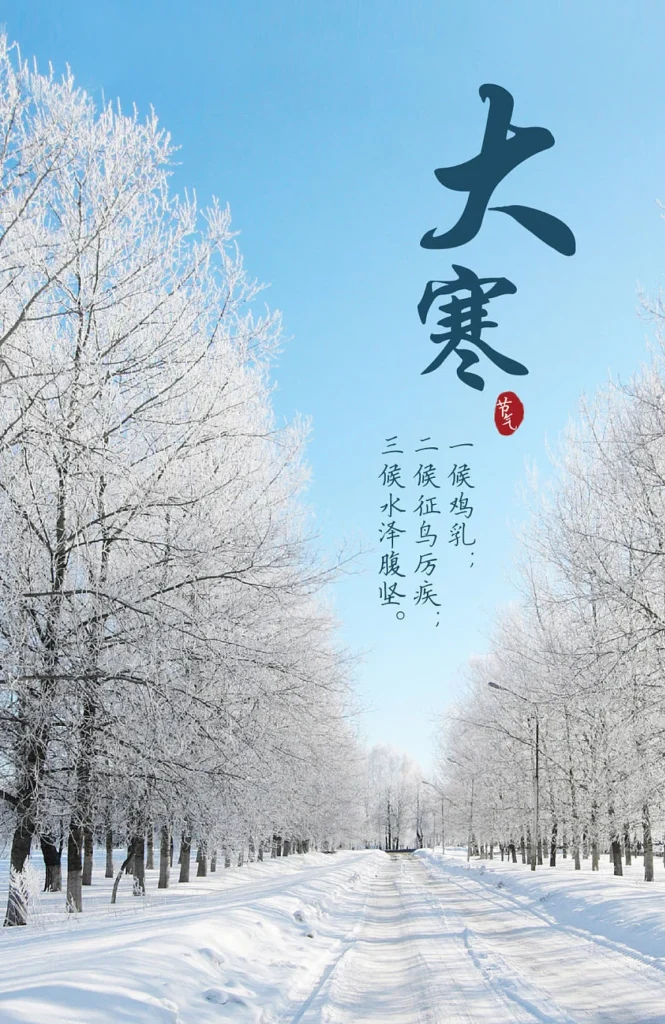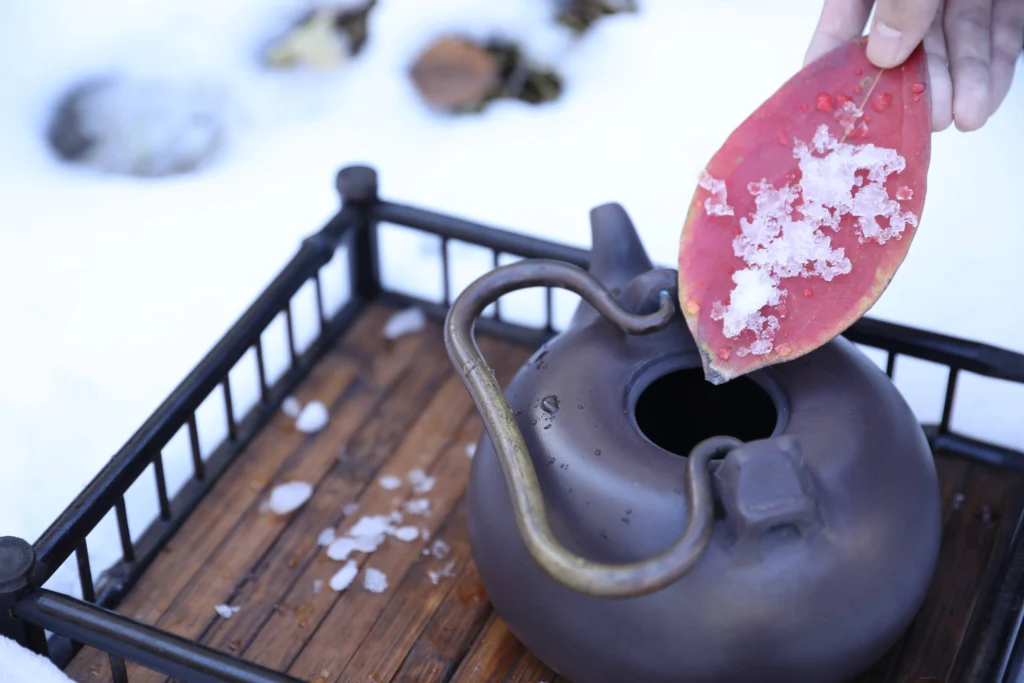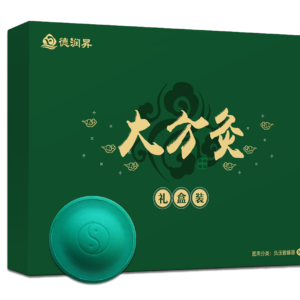It’s January 20, 2024 today, a.k.a. December 10 in Lunar Calendar. It is also the last festival in the 24 solar terms of the year – Great Cold Festival. Interestingly in the Eastern coast of US we have had some big snowing storm in the past few days and the entire world is covered by pure and beautiful snow, which remind me of a great healing tradition in Traditional Chinese Medicine (TCM) – collecting snow water around Great Cold Festival for healing purpose.
Collecting clear snow-water during the Great Cold Festival (大寒) is a traditional practice in Chinese cultures, as TCM believes it has various health benefits. It is often thought to be purer and cleaner than regular water. Some potential health benefits attributed to consuming snow-water include improved digestion, healing cold symptoms, enhanced skin health, and overall refreshment.

Recorded Health Efficacy of Using Snow Water:
The famous “Compendium of Materia Medica” in TCM records that snow water has the ability to detoxify and treat plagues. Following is a quote from the classic works:
“Winter snow, sweet and cold, non-toxic, dispels all poisons. It treats the seasonal epidemic, feverish convulsions in children, initiates the effects of medicinal stones in adults, sudden heat after alcohol consumption, persistent jaundice; still effective with a mild and warm dosage. Rinsing vessels and washing eyes with snow water reduces redness; boiling tea and cooking porridge helps relieve heat and quench thirst.”

This excerpt highlights the medicinal properties attributed to winter snow in TCM, It suggests various therapeutic applications, such as treating epidemic diseases, feverish conditions in children, and addressing issues like jaundice and heat-related symptoms in adults. Additionally, the use of snow water for rinsing and cooking is recommended for specific health benefits.
Snow water has distinct properties that differentiate it from regular water. It contains 25% less heavy water than regular water and more enzyme compounds compared to ordinary water, which has inhibitory effects on the metabolism of living organisms. Additionally, snow water has fewer gases compared to normal water. Its distinct structure and composition make it closer to the nature of water, Pure snow water is considered a wonderful natural beverage. In ancient times, literati and scholars often brushed off fresh snow from branches to boil tea, enjoying its clear and refreshing taste with additional health benefits.

Research indicates that snow water contains more enzyme compounds than regular water. Therefore, contemporary medicine generally believes that drinking 1-2 cups of snow water daily can significantly lower cholesterol levels in the blood, preventing and treating atherosclerosis. Heavy water has inhibitory effects on the metabolism of living organisms. In winter, as snow falls abundantly, people often overlook its role. Snow has many advantages for human health, as recorded in the “Compendium of Materia Medica.”
However, it’s essential to note that consuming snowwater directly may carry risks, as it can be contaminated by pollutants or impurities present in the atmosphere. It is advisable to melt the collected snow, applying water filter to further purify it, and boil it before drinking to ensure its safety.
Falk-Tradition Uses of Snow Water:
In the 41st chapter of “Dream of the Red Chamber,” when Miaoyu serves tea to Bao Yu, the tea is brewed using snow water. Miaoyu explains that the water comes from the snow on plum blossoms collected five years ago, preserved in a jar and only opened this summer. Bao Yu, after sipping the tea, praises its lightness and agrees with its exceptional quality. Regular use of snow water for bathing can enhance the skin’s resistance, promote blood circulation, and reduce the risk of diseases.
In folk traditions, snow water in the twelfth lunar month is referred to as the “inexpensive medicine,” with a wide range of applications:
Anti-inflammatory, Anti-swelling, Pain Relief, and Itch Relief:
Snow, with its pure and flawless white color, is associated with the lung meridian and is effective in clearing lung-related heat and toxic factors.
Treatment of Various Conditions:
Snow water is effective in treating conditions such as red eyes, skin burns, and frostbite. For mild cases, applying and washing with snow water every three to four hours without the need for medication can lead to recovery within four to five days. For more severe cases with prolonged healing times or infected wounds, using multiple layers of gauze soaked in snow water and continuously moistening the wound can also reduce inflammation, alleviate pain, promote tissue regeneration, and facilitate scabbing and healing over time.

Eye Inflammation and Skin Conditions:
Red and swollen eyes due to excessive heat can be treated by washing the eyes with snow water in the twelfth lunar month. In summer, prone to heat and humidity-induced prickly heat, applying snow water can alleviate discomfort and itching.
Regularly bathing with snow water enhances skin resistance, improves blood circulation, and reduces the risk of diseases. Scientific studies suggest that using snow water-soaked seeds for planting significantly increases crop yield. Similarly, feeding animals such as pigs and chickens with snow water contributes to their robustness and increased egg production.
Agricultural Application
Snow water can be used to irrigate crops, improving their quality. Investigative studies suggest that the sweetness of certain fruits like Hami melons and seedless grapes from Xinjiang is attributed to the substantial use of snow water for irrigation.
Beautification:
Snow water, associated with the kidney meridian, contributes to nourishing the kidneys and replenishing yin. Ancient beauty practices include using snow water to brew a concoction called “Three Flowers,” made from dried peach blossoms in spring, lotus flowers in summer, and hibiscus flowers in autumn. This solution, applied regularly, is believed to have anti-aging and skin-beautifying effects.

Tea Brewing:
The ancient Chinese tea sage Lu Yu highly praised the use of ice and snow water in tea brewing. In the past, with less industrial development and lighter air pollution, snow water was considered pure and drinkable. Brewing tea with snow water was valued for its sweetness and refreshing coolness.
Cooking and Nutrition
Using snow water to salt chicken eggs during winter has been a traditional practice. Snow water, derived from the natural melting of snowflakes in the air and subsequently on the ground, is considered a pure and uncontaminated form of water. Below zero degrees Celsius, the eggs salted with snow water acquire a pure and authentic taste, along with a bright and vibrant color. In many rural households, this handmade culinary technique has been passed down through generations. The cultural tradition involves utilizing the pristine properties of snow water to enhance the flavor and quality of food, specifically seen in the salting of chicken eggs during the winter season.

In summary, snow water in the twelfth lunar month holds significant cultural and practical value in TCM practices, extending its uses from medicinal applications to agricultural benefits and even beautification rituals.
Keep in mind that while there are cultural beliefs surrounding the health benefits of collecting snow water during the Great Cold Festival, scientific evidence may be limited. As with any health-related practices, it’s crucial to exercise caution and consult with your TCM healthcare professionals for personalized advice.
For more information on winter wellness practice and other health issues, please come to our weekly Qigong for Health class online at 9am EST every Sunday. Here is the link for registration:



